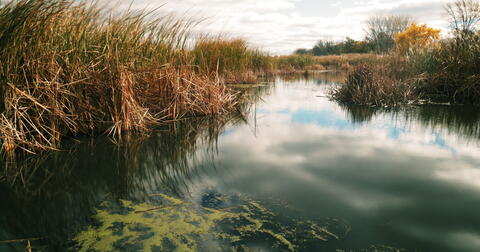Supreme Court ruling will not leave Michigan’s waters unregulated
Ruling in Sackett v. EPA rolls back federal overreach; state regulators can still act
The effects of a recent U.S. Supreme Court ruling on water regulation in America were greatly exaggerated. Especially in Michigan.
“The Supreme Court ripped the heart out of the law we depend on to protect American waters and wetlands. The majority chose to protect polluters at the expense of healthy wetlands and waterways. This decision will cause incalculable harm. Communities across the country will pay the price.”
So said Manish Bapna, chief executive of the Natural Resources Defense Council, in response to the May 25 Supreme Court ruling in Sackett v. EPA.
In the Sackett ruling, the court took essential steps to rein in overzealous federal agencies and to protect the rights of private property owners.
As more information comes out about the case and triggered emotions begin to calm, Michigan-based legal and environmental opinions are echoing the Mackinac Center’s take on the court’s ruling. The court found that jurisdiction over many of these wetland features was properly held by states and that state law is more than sufficient to protect wetlands and water features.
Sackett v. EPA focused on a dispute over a plot of lakefront land in Idaho that was purchased by Michael and Chantell Sackett in 2004 as the site for their family home. After obtaining the necessary state and local permits to build, the Sacketts began filing in some low, wet portions of the property to prepare the lot for construction.
The EPA intervened, claiming low-lying areas on the property had a “significant nexus” to navigable waters in the area and were therefore under the jurisdiction of the EPA as “Waters of the United States.” EPA officials threatened the Sacketts with fines as high as $40,000 per day until they returned the property to its prior state. The Sacketts sued and took the case through a string of courts, finally ending up in the U.S. Supreme Court.
The Supreme Court’s ruling was unanimous. All nine justices agreed that the EPA had overstepped its legal authority. The court’s final ruling, written by Justice Samuel Alito and supported by four other justices, also rebuffed the broad and ambiguous “significant nexus” test that had been created in a 2006 opinion by Justice Anthony Kennedy.
Alito noted that under the Clean Water Act, the term “Waters of the United States” refers only to “geographical features that are described in ordinary parlance as ‘streams, oceans, rivers, and lakes,” and to adjacent wetlands that are “indistinguishable’ from those bodies of water due to a continuous surface connection.”
Alito continued:
to assert jurisdiction over an adjacent wetland under the [Act], a party must establish ‘first, that the adjacent [body of water constitutes] . . . ‘water[s] of the United States’ (i.e., a relatively permanent body of water connected to traditional interstate navigable waters); and second, that the wetland has a continuous surface connection with that water, making it difficult to determine where the ‘water’ ends and the ‘wetland’ begins.
Michigan’s environmental groups erupted after the decision, claiming that this new interpretation of the Clean Water Act would leave wetlands and water features across the state essentially unregulated.
The Michigan League of Conservation Voters criticized the ruling as “legislating from the bench” and lacking jurisprudence. Healing Our Waters-Great Lakes Coalition director Laura Rubin attacked the ruling. She claimed that “The Supreme Court’s decision to abolish clean water protections for wetlands will undermine Great Lakes restoration efforts and jeopardize drinking water sources that millions of people depend on.”
In an article for the The Detroit News, I argued that the ruling recognized the rights of private property owners and “restrict[s] the federal government from essentially usurping authority it never should have had.” Instead, I noted, “Michigan’s wetlands law will continue to protect the state’s water quality.”
A recent MLive article corroborates Mackinac Center reassurances on the impacts of the Sackett v. EPA case. The article quotes “legal experts and state officials” who agree that state laws will be sufficient to protect wetlands in the state.
It’s business as usual for wetlands protection in Michigan following a U.S. Supreme Court decision which significantly narrows federal authority to regulate wetlands. State law remains unchanged despite the May 25 ruling in Sackett v. The U.S. Environmental Protection Agency.
That’s because Michigan is one of three states which has authority to govern its own wetlands under Parts 303 and 323 of the state’s Natural Resources and Environmental Protection and Management Act. State regulations specifiy how a wetland area comes under the jurisdiction of the Department of Environment, Great Lakes, and Energy:
In accordance with Part 303, wetlands are regulated if they are any of the following:
- Connected to one of the Great Lakes or Lake St. Clair.
- Located within 1,000 feet of one of the Great Lakes or Lake St. Clair.
- Connected to an inland lake, pond, river, or stream.
- Located within 500 feet of an inland lake, pond, river or stream.
- Not connected to one of the Great Lakes or Lake St. Clair, or an inland lake, pond, stream, or river, but are more than 5 acres in size.
- Not connected to one of the Great Lakes or Lake St. Clair, or an inland lake, pond, stream, or river, and less than 5 acres in size, but EGLE has determined that these wetlands are essential to the preservation of the state's natural resources and has notified the property owner.
While environmental groups were quick to attack the Supreme Court ruling, claiming it left wet areas in Michigan unregulated and unprotected, a more clear-headed reading of the ruling should put those fears to rest.
Jason Hayes is director of energy and environmental policy at the Mackinac Center.
Michigan Capitol Confidential is the news source produced by the Mackinac Center for Public Policy. Michigan Capitol Confidential reports with a free-market news perspective.

